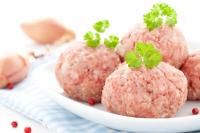Know poisonous plants for horses and act correctly
Which plants are poisonous and how to recognize them
-
Adonis florets: Even small amounts can cause symptoms of poisoning in horses.
Adonis florets in a meadow. Image source: https://pixabay.com/de/photos/natur-blume-fr%C3%BChlings-adonisr%C3%B6schen-3314658/ Image creator: Schwoaze -
Wood anemone: This plant also appears harmless, but it can be harmful to horses in a number of ways.
The flower of a wood anemone. Image source: https://pixabay.com/de/photos/buschwindr%C3%B6schen-bl%C3%BCte-blume-wei%C3%9F-4285419/ Image creator: HOerwin56 -
Boxwood: As much as it is valued as an easy-care hedge plant, it has no place in a horse paddock. If a horse nibbles on it, it can cause major damage and even death.
A boxwood as a hedge plant. Image source: https://unsplash.com/de/fotos/ein-busch-mit-vielen-grunen-blattern-darauf-Vd8jgdepQgY Image creator: kristyle -
Monkshood: This plant is so poisonous to humans and animals that it was even considered a murderous tool in the Middle Ages. So she has no place in a paddock.
Two flowering monkshood plants. Image source: https://pixabay.com/de/photos/blume-pflanze-natur-alm-eisenhut-5258360/ Image creator: Seiso -
bracken: You have probably seen this plant somewhere before, it is widespread here. It is better to remove it from your horses' paddocks as consumption has harmful health consequences.
A bracken leaf. Image source: https://pixabay.com/de/photos/adlerfarn-pflanze-natur-blatt-3701757/ Image creator: jeonsango -
thimble: A beautiful plant in itself that is similar to monkshood. The plant is dangerous or even fatal for horses and should therefore be removed from the paddock.
A foxglove plant. Image source: https://pixabay.com/de/photos/fingerhut-blume-rosa-natur-pflanze-814501/ Image creator: Vitamin -
Autumn crocus: Even though it is a popular ornamental plant with its purple flowers, your horse should not nibble on it. The autumn crocus is a highly poisonous plant and should be urgently removed from the pasture.
A blooming autumn crocus. Image source: https://pixabay.com/de/photos/herbstzeitlose-lila-krokusgew%C3%A4chs-190782/ Image creator: Ephraim's daughter -
Ragwort: If you notice this plant in the paddock, you should remove it immediately. Consumption is harmful to health in small quantities and fatal in larger quantities.
Highly poisonous in all parts: St. James' ragwort. Image source: https://pixabay.com/de/photos/blume-jakobskreuzkraut-bl%C3%BCte-gelb-429526/ Image creator: aloiswohlfahrt -
Gundelrebe: It is also known as Gundermann. Even if it is used for us humans in herbal medicine, all parts of it are still poisonous to horses.
The Gundelrebe/Gundelmann appears harmless, but is very dangerous for horses. Image source: https://pixabay.com/de/photos/gundermann-blume-bl%C3%BCte-pflanze-116261/ Image creator: Hans -
Buttercup/buttercup: This well-known plant feels at home in the paddock, but should not end up in your horse's stomach due to its poison.
Buttercups/buttercups bloom in a meadow. Image source: https://pixabay.com/de/photos/butterblume-hahnenfu%C3%9F-wiese-6346165/ Image creator: Nennieinstwodrei -
dandelion is also not safe for horses. Depending on the amount consumed, it can be harmful to horses and even fatal in large quantities.
Dandelions in a meadow. Image source: https://pixabay.com/de/photos/l%C3%B6wenzahn-wiese-l%C3%B6wenzahnwiese-3494398/ Image creator: NoName_13 -
crocus: In spring it can be a real feast for the eyes, but unfortunately it is a danger in the paddock as consumption is poisonous for horses.
Here in the picture you see purple and yellow crocuses, they are also available in white. Image source: https://pixabay.com/de/photos/krokus-krokusse-fr%C3%BChling-bl%C3%BCte-300045/ Image creator: blickpixel
Anyone who owns a horse has to take care of a lot. Stables, suitable paddocks for exercise...
This list is intended to provide an overview of the common plants that can be dangerous to horses. It is advisable that you regularly check your paddock for these growths and remove them if they are present.
You should also check the roughage in the form of hay and straw for poisonous plants and, if necessary, remove them thoroughly. In general, you should be careful about plants that you do not know and, if in doubt, it is better to find out more about whether you are dealing with a poisonous plant. This is not excessive caution, on the contrary. You may save your horse's life.
In case of poisoning: You can recognize it by these symptoms
If the worst case scenario has occurred despite all precautions, your horse will show the following symptoms. These can occur individually or in combination.
Signs of plant poisoning in horses
- Balance disorders
- Shortness of breath
- general restlessness, increased nervousness
- Tremble
- Symptoms of paralysis
- Seizures
- Diarrhea, colic
- Foaming at the mouth
- increased pulse
- Apathetic states
What should you do if poisoning has occurred?
If you notice one or more of the symptoms mentioned in your horse, you should consult a veterinarian as soon as possible. If you suspect that a poisonous plant is causing your symptoms, you should say so right away on the phone. It will be a great help to the vet if you can answer the following questions:
- Which plant do you suspect?
- Roughly how much of it did the horse eat?
- Which of the above symptoms indicate poisoning?
If the worst comes to the worst, the veterinarian knows best what to do. It is advisable for pet owners of all types to have the practice's number on a speed dial button on their cell phone in case of emergencies. Or on a piece of paper near the stable telephone.
The best way to prevent poisoning from toxic plants is to search the pasture for them and remove the poisonous plants if necessary. This also applies to hay, straw and silage. Furthermore, you or someone you designate should always keep an eye on the horses when they are in the paddock. If symptoms of poisoning occur, the veterinary practice or clinic must be informed immediately.



